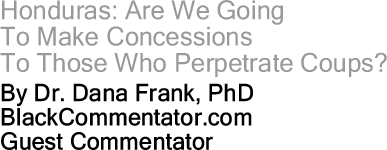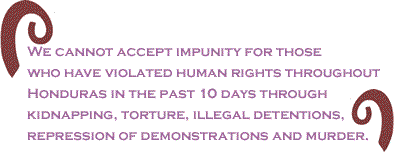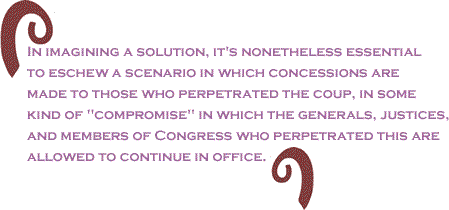
|
|||||||||||||||||||||||

|
|

Custom Search
|
|
 |
|
| Now
that the legitimate President of Honduras, Manuel Zeleya, is sequestered
in "negotiations" in Costa Rica with Roberto Micheletti,
the very man, who ordered his kidnapping at gun point and removal
from the country, we can ask: what does it mean to "negotiate"
with the perpetrators of a coup? Although
many on the far right are crying out that Zelaya himself was trying
to subvert the Honduran constitution-- which he wasn't -- it is
certainly clear that Micheletti and his oligarchs could have followed
a legal procedure had that been the case. The Honduran constitution
allows for impeachment, as well as a precise legal structure in
which an official can be officially charged and allowed to defend
himself. Micheletti and General Romeo Vasquez, by contrast, with
the support of the Honduran Supreme Court and most of Congress,
completely subverted the rule of law and occupied the country militarily.
Leticia Salomon, a prominent Honduran sociologist and economist,
in an extended analysis released on July 3, underscores the key
elements necessary in any solution to the conflict: not only the
restitution of President Zelaya to office, but a removal from power
of all those who violated the law in supporting the coup -- including
the highly politicized judges of the Supreme Court, the military,
and those in Congress who voted to support the bogus presidency
of Micheletti, and who falsified documents in which Zelaya supposedly
renounced his office.
Second,
they demand an end to the use of chemical and lethal weapons to
repress demonstrations, and the removal of the Armed Forces from
responsibility for managing public demonstrations. They also call
for the return to civil control of all public services, electric
power, telecommunications, hospitals, and other bodies, which are
currently being controlled by the military. Nor
should the coup lead to concessions to U.S. power. When Jean Bertrand
Aristide, president of Haiti, was overthrown in a 1991 coup, the
U.S. flew him back on a plane and restored him to power, but with
a price: that Aristide support the policies of the World Bank and
International Monetary Fund, which notoriously led to even worse
poverty and a second coup. In Honduras today, Greg Grandin cautions
in The Nation, "Washington should follow the lead of the rest
of the Americas and resist the temptation to attach conditions to
its support for his return to office." Note: More than 35 scholars and experts on Latin America have sent an open letter to U.S. Secretary of State Hillary Clinton urging against the idea of early elections in Honduras as a possible resolution of the current crisis resulting from the June 28 military coup d'etat. New American Media (NAM) contributor, University of California, Santa Cruz Professor Dana Frank is among them. This commentary originally appeared in New American Media (NAM). BlackCommentator.com Guest Commentator Dr. Dana Frank, PhD is professor of history at the University of California, Santa Cruz, and the author of Bananeras: Women Transforming the Banana Unions of Latin America. Click here to contact Dr. Frank. |
|
Any BlackCommentator.com article may be re-printed so long as it is re-printed in its entirety and full credit given to the author and www.BlackCommentator.com. If the re-print is on the Internet we additionally request a link back to the original piece on our Website. Your comments are always welcome. eMail re-print notice
If you send us an eMail message we may publish all or part of it, unless you tell us it is not for publication. You may also request that we withhold your name. Thank you very much for your readership. |
|
| |
|
| July
16, 2009 Issue 333 |
|
| Executive Editor: Bill Fletcher, Jr. |
| Managing Editor: Nancy Littlefield |
| Publisher: Peter Gamble |
| Est. April 5, 2002 |
Printer Friendly Version
in resizeable plain
text format or pdf
format. |
| Frequently Asked Questions |
 |

|
 |
 |
 |
| |
| |






































